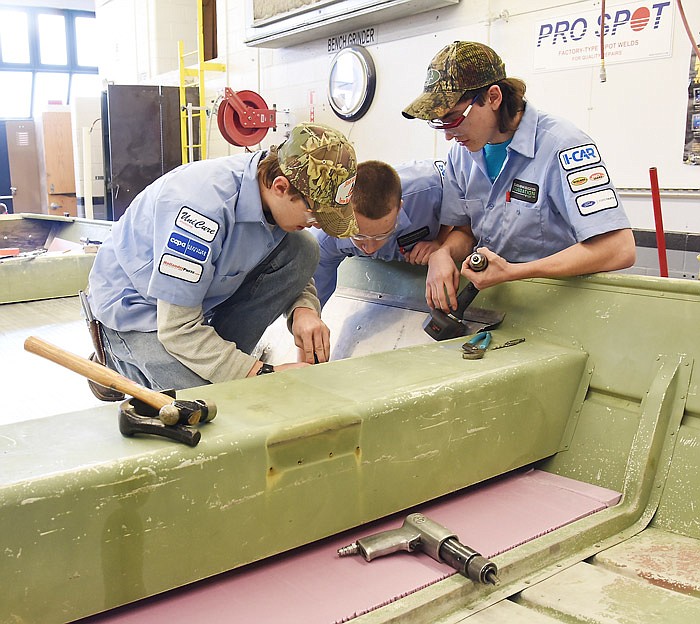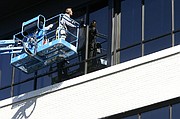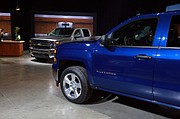There's an awareness gap locally between students and prospective employers, according to local workforce assessment experts.
"Opening students' eyes" during high school to local career opportunities is a fairly new concept, said Janet Weckenborg, chairwoman of the Jefferson City Area Chamber of Commerce board and chairwoman of the Chamber's Workforce Action Team.
While it may be a newer concept, connecting local students upon graduation to local employment - above minimum wage - is a goal taken seriously by organizations like the Chamber and Nichols Career Center.
The goal runs two ways - connect local graduates to local opportunities but also prepare graduates to be marketable to employers.
On one hand, she said, students and their parents have said they don't have a good understanding of local job opportunities.
On the other, she said, employers are looking for students with professional skills - students who can "understand concepts of full-time employment" and "who can make successful transitions."
Weckenborg said: "Sometimes it's not as easy as you think it would be" to help high school graduates transition to the local workforce.
Travis Plume, a counselor at Nichols Career Center, agrees it's a common theme for local employers to want professional skills from applicants and not just technical ones.
He said young graduates may not understand the consequences of their actions, and teachers at Nichols try to make them understand they're being prepared for careers that require skills like responsibility, flexibility and self-motivation as much as knowledge of mechanical, biological or other systems.
Plume and Nichols Director Sharon Longan said the career center focuses on getting students to be well-rounded and competitive.
"Our kids are ready to go from day one," Plume said.
Nichols has a rubric of criteria from Missouri's Department of Elementary and Secondary Education that scores students on personal and workplace skills as well as technical ones.
Employers don't see an individual student's score sheet, but Plume said "I would bet" employers think the criteria is critical.
Nichols also conducts a survey every five years to ask what employers are looking for in applicants.
In terms of placement rates following graduation, Nichols does well overall. In 2015, 98 percent of Nichols graduates reported placement in a two- or four-year college, in the workforce or military within 180 days of graduation. One hundred percent of auto tech, collision tech, graphic communications, heating, ventilation and air conditioning, mechatronics and welding students reported placement within that time frame.
Longan said Nichols doesn't have to report to the state whether placement is local versus elsewhere.
She said followup is conducted by phone and email surveys - "any way we can find a link to a student."
"Capturing the audience" with the right information and mode of media to encourage the right career connections is something Holly Nunn said Jay Pride Alive knows is "a need that has to be addressed." Nunn is the president of Jay Pride Alive - Jefferson City High School's alumni association.
Nunn said the organization has "not found a way to successfully connect recent graduates" to itself. She said it's something the board wants to focus on this year.
One reason she said it's often difficult to connect with recent graduates is their contact information often changes, and the graduates don't keep the association informed of the changes.
When recent graduates are connected to and made aware of local career opportunities, Weckenborg said, the response has been positive.
"We've had a great response from students and their parents" about the number of jobs available locally and technology components and other opportunities available within those jobs, she said.
She said other Chamber members are citing positions within the companies and organizations they work for that go unfilled - and many don't even require a two-year college degree.
A 2016 labor availability analysis of the "Jefferson City labor basin," prepared for the Chamber by the Docking Institute of Public Affairs at Fort Hays State University in Kansas, found nearly a third of the available labor force in the area reported being underemployed. Underemployment was defined in the study as "individuals possessing skills and/or training levels that exceed the responsibilities of their current job."
The Jefferson City labor basin covers Cole, Callaway, Osage, Moniteau, Cooper, Morgan, Miller, Maries, Gasconade and Montgomery counties, as well as the parts of Boone County south of Interstate 70.
Weckenborg said the Workforce Action Team hopes to continue to expand its outreach efforts to inform local graduates about the opportunities available to them in the area.
They want to reach out to students directly with a job hiring fair in April in addition to the one they have in October in conjunction with the Jefferson City Public School District's college night.
Last October, Weckenborg said, many employers expressed interest in having representatives present at tables at the event - 22 tables got filled in four days of informing employers about the opportunity. The employers weren't recruiting, but conveyed the message that "here are some jobs you can have" after graduation.
The Chamber's workforce team wants to expand the hiring event in April to high schools in communities like Eugene, Fatima and Linn. Weckenborg said a lot of people live in "bedroom or outlying small towns" who commute into Jefferson City for work.
The full plan won't be presented until the board's February meeting, she said.
Work on a job-posting database is also being done, on which Chamber members would be able to post local positions, she said.
From Nichols' point of view, Plume said, their internship program is often how their students acquaint themselves with local opportunities - "a seamless transition into the workforce." He said there is a job fair in October, but usually during the average day, there isn't much time set aside to provide information about local opportunities, as instructional time is the focus.
"We also don't have the luxury of space" available to have job fairs during the day, given many classrooms in the building are currently used to fill overflow capacity from Jefferson City High School, Longan said.
However, Longan said they do get guest speakers sometimes from State Technical College of Missouri in Linn and State Fair Community College in Sedalia.
She also said "We get phone calls all the time" from employers advertising openings.
Despite important efforts to make career connections, Weckenborg said, there's a fine line between encouraging students to look at local career opportunities but also encouraging them to stay in school and graduate - "because long-term that will help them so much more" than leaving school early and entering the job market.
Read more Jefferson City area business features and news in the latest issue of #jcmo Inside Business.



